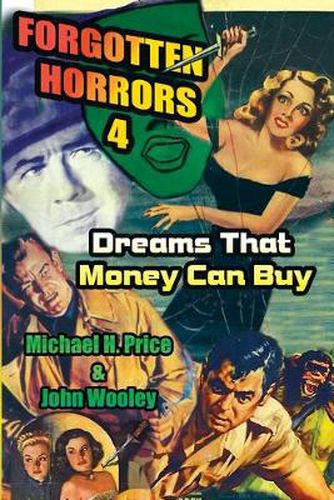Readings Newsletter
Become a Readings Member to make your shopping experience even easier.
Sign in or sign up for free!
You’re not far away from qualifying for FREE standard shipping within Australia
You’ve qualified for FREE standard shipping within Australia
The cart is loading…






This title is printed to order. This book may have been self-published. If so, we cannot guarantee the quality of the content. In the main most books will have gone through the editing process however some may not. We therefore suggest that you be aware of this before ordering this book. If in doubt check either the author or publisher’s details as we are unable to accept any returns unless they are faulty. Please contact us if you have any questions.
By laying down a dime or 15 cents at the box office, a gawky, socially awkward kid could live for a few hours in a dream world of jitterbugs and bobbysoxers, running right alongside Poverty Row stars bravely entering forbidding haunted houses and creepy cemeteries. And that is what most of the pictures in this volume are: little dreams, made all the more dreamlike by their obscurity. The pictures are not big-studio productions full of high-wattage star power, but quirky titles from little studios. Forgotten Horrors 4 remains focused on the tawdry (but no less magical) Hollywood backstreet known as Poverty Row. From their Poverty Row vantage, actors gazed out at the Golden City just beyond their grasp and, between shots on cheap sets in quickie productions for directors far beneath the station of DeMille, imagined life as Gregory Peck or Loretta Young. Seen today, these small-studio pictures carry a quirky, almost heartwarming nobility. They know what they are, and the people involved allowing for factors ranging from disillusionment to cynicism to John Barleycorn seem to be doing the best they can. They know it s not MGM or Paramount. But anyway, they are working. Without the bankable stars that all America knew, the people who made these films had to have Something Else going for them. And that Something Else was almost always an exploitable angle, something the theater owners could sell in lieu of marquee names. In the pictures examined between these covers, that Something Else was a horrific or bizarre element of one sort or another, ranging from simple murder to terrors far more fiendish. In the Westerns and the comedies, the horror element often came as a lagniappe, giving an extra thrill to the folks who probably would have shown up anyway. And rather than fading into obscurity, these little gems still manage to entertain us almost 60 years after their debuts.
$9.00 standard shipping within Australia
FREE standard shipping within Australia for orders over $100.00
Express & International shipping calculated at checkout
This title is printed to order. This book may have been self-published. If so, we cannot guarantee the quality of the content. In the main most books will have gone through the editing process however some may not. We therefore suggest that you be aware of this before ordering this book. If in doubt check either the author or publisher’s details as we are unable to accept any returns unless they are faulty. Please contact us if you have any questions.
By laying down a dime or 15 cents at the box office, a gawky, socially awkward kid could live for a few hours in a dream world of jitterbugs and bobbysoxers, running right alongside Poverty Row stars bravely entering forbidding haunted houses and creepy cemeteries. And that is what most of the pictures in this volume are: little dreams, made all the more dreamlike by their obscurity. The pictures are not big-studio productions full of high-wattage star power, but quirky titles from little studios. Forgotten Horrors 4 remains focused on the tawdry (but no less magical) Hollywood backstreet known as Poverty Row. From their Poverty Row vantage, actors gazed out at the Golden City just beyond their grasp and, between shots on cheap sets in quickie productions for directors far beneath the station of DeMille, imagined life as Gregory Peck or Loretta Young. Seen today, these small-studio pictures carry a quirky, almost heartwarming nobility. They know what they are, and the people involved allowing for factors ranging from disillusionment to cynicism to John Barleycorn seem to be doing the best they can. They know it s not MGM or Paramount. But anyway, they are working. Without the bankable stars that all America knew, the people who made these films had to have Something Else going for them. And that Something Else was almost always an exploitable angle, something the theater owners could sell in lieu of marquee names. In the pictures examined between these covers, that Something Else was a horrific or bizarre element of one sort or another, ranging from simple murder to terrors far more fiendish. In the Westerns and the comedies, the horror element often came as a lagniappe, giving an extra thrill to the folks who probably would have shown up anyway. And rather than fading into obscurity, these little gems still manage to entertain us almost 60 years after their debuts.